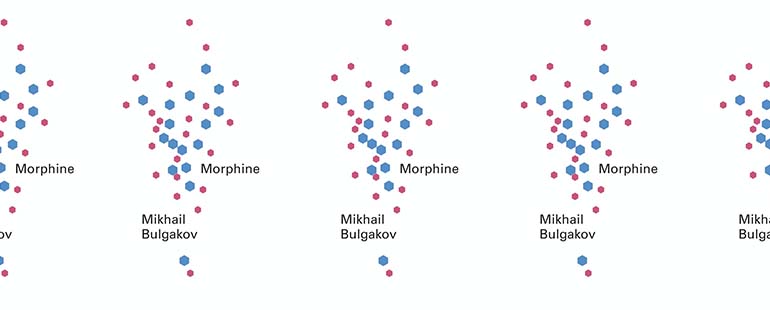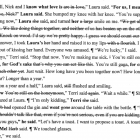Morphine’s Resonant Portrayal of Addiction

If one were to substitute “opioid” for “morphine,” Mikhail Bulgakov’s 1926 novella Morphine, published in English translation from the original Russian by Hugh Aplin in 2013, feels like it could have been written yesterday. Bulgakov draws from his own experience as a medical doctor who became addicted to morphine in 1917 after being given the drug to treat his abdominal pain following war wounds; he stopped using the following year. Morphine, set during the same time period, is focused on Dr. Bomgard and his medical school classmate, Dr. Sergei Polyakov, the latter of whom dies at age 25 after being treated with morphine following excruciating abdominal pain. Upon his death, Polyakov entrusts Bomgard with his journal, which makes up the second half of the novella. Reading Morphine now is nearly unbearable: it asks us to look at how little perception and treatment of substance use disorder has changed over the course of a hundred years.
“Clever people have been pointing out for a long time that happiness is like good health: when it’s there, you don’t notice it,” Bomgard says. “But when the years have passed, how you do remember happiness, oh, how you do remember it!” At the start of the novella, he reminisces about the blizzardy winter of 1917 when he was liberated “from [his] remote district to a small provincial town.” For the year and a half he spent at the remote post, Bomgard felt isolated and rapped by “stern, sorry woods.” He opened week-old mail “with beating heart, the way a happy lover does.” Leaving this depressing, lonely place brought elation. “For the first time I felt like a human being,” he says, “whose degree of responsibility was limited by some sort of framework.” He wonders about the poor fellow who replaced him and is surprised and annoyed, which prompts a migraine, when he learns that it was his university classmate, Polyakov, who now seeks treatment from him for an undisclosed grave illness. “[I]t’s unworthy to denigrate him, even in my mind because of migraine, because of anxiety,” Bomgard chides himself. “I haven’t seen him for two years, Seryozha Polyakov, but I remember him well. He was always a sensible man.” Polyakov arrives at Bomgard’s house barely alive after shooting himself, though Bomgard doesn’t realize Polyakov’s affliction until reading his notebook: “I’ve changed my mind about having treatment. It’s hopeless,” Polyakov writes. “And I don’t want to suffer any more either. I’ve had enough. I caution others: be careful with white crystals dissolved in twenty-five parts of water. I put too much trust in them and they have been my undoing.” The white crystals Polyakov refers to are morphine, prepared with the method used for subcutaneous injection.
Bomgard’s depiction of his former post brings to mind Bruce Alexander’s Rat Park, an experiment, undertaken over the course of the 1970s, in which he gave rats the choice of water or a sweetened morphine solution in two environments: an idyllic one and one perhaps as depressing as the remote location. Palace rats preferred water, while the caged rats chose morphine. Alexander “created heaven and found—no surprise—that in it we are happy. But where is there heaven on earth?” Lauren Slater writes in Opening Skinner’s Box: Great Psychology Experiments of the Twentieth Century (2004). “Does rat park truly reflect ‘real life,’ possible life, or does it in fact only confirm that addiction is only avoidable in a world of utter myth, which is not, never has been, and never will be the human world, we with our dented genes and buildings.” For both Bomgard and Polyakov, the cage is the same—Bomgard only avoids addiction because he wasn’t exposed to morphine. Polyakov, recuperating in the cage after separation from his wife and suffering through chronic pain, was. Anna Kirillovna, a feldsher and midwife—“a very nice and mature person,” in Polyakov’s words—injects him with his first dose. Seven minutes later, Polyakov’s pain ceases. “I cannot but give praise to the first man to extract morphine from poppy heads,” he says. “A true benefactor of mankind.”
Polyakov attributes to morphine relief from both his physical pain and his heartbreak. “[M]y thoughts haven’t once returned to the woman who deceived me,” he notes after continued use. “I’m very proud of this. I’m a man.” Morphine, he believes, restores his very essence and improves his job performance. The drug’s numbing euphoria sweeps Polyakov in its embrace; his description of it is intimate: “a sensation of something touching [his] neck . . . [a]bsolutely all unpleasant sensations cease.” But he observes changes in those around him after he begins using. “Anna K. is scared,” he writes. “I reassured her, saying that ever since I was a child I’ve been noted for the most enormous strength of will.” His sensibleness and strength of will, however, is no match for morphine, which Polyakov only admits in fleeting moments.
“‘Go away on leave. Morphine isn’t treatment,’” Anna pleads with Polyakov a month into his using. Polyakov writes, “[S]he had a think and added, ‘I can’t forgive myself for preparing the second bottle for you that time.’” This time, she withholds preparing a dose, something he doesn’t know how to do. To continue using safely, he needs her, but she denies him the drug and implies that he’s becoming addicted. “Here, for the first time, I discovered in myself an unpleasant capacity to get angry and, most importantly, shout at people when I’m in the wrong,” Polyakov observes before hurling a quarter-full syringe on the ground—a move he regrets when it almost breaks, risking his precious remainder. He’s desperate and yet aware, but his anger is beginning to overtake him. He demands that Anna give him the pharmacy keys. “Fury was sizzling in my soul,” he writes, “first and foremost because I have absolutely no idea at all how to prepare a morphine solution for subcutaneous injection.” Anna relents, knowing that if she refuses to prepare the injection, Polyakov will resort to dangerous measures. She follows him to the pharmacy “like a faithful dog,” Polyakov says, which prompts “a tenderness” in him that he suppresses. Instead he demands, “Are you going to do it or not?” He cannot see the position Anna is in, nor how painful the decision is for her as she tries to parse caring from enabling. Once high, Polyakov begs her forgiveness for his “senseless rudeness,” while thinking that he “used to be a polite person.” Even as he recognizes changes in his character, he dismisses the possibility that he’s addicted, calling it “a little habit.”
Four months into using, Polyakov tries to get sober. Though withdrawal is excruciating, he belittles his dependence and places the blame for it on himself. “I’m simply tormenting and weakening myself with this silly struggle with morphine,” he writes. The attempt doesn’t take, so, finally, he agrees to treatment in Moscow. Soon after, however, he flees the clinic and begins using again. “Thank you, morphine, for making me brave,” he writes. “And what is there in general that can frighten a man who thinks of only one thing—of the wonderful, divine crystals.” His emotions here are conflicted: the drug is “wonderful, divine” and makes him feel confident, though it also fills him with shame. The next time he tries detoxing, he rips pages from his journal “so that nobody would read the shameful description of the way a man with a degree fled furtively, like a coward, and stole his own suit.” He should know better, he feels, because he is educated. Later, though, after observing “contempt showing through the compassion” on the clinic psychiatrist’s face, he says that he shouldn’t feel ashamed. “And that was wrong,” Polyakov asserts. “I’m ill.” He subscribes to the disease model of addiction: addiction as illness, not something criminal and shameful. And yet, disturbed and out of leave time, Polyakov begs the psychiatrist to release him back to work without disclosing his addiction, which the psychiatrist agrees to despite it being obvious that Polyakov is high during the appointment. The shame returns again: Polyakov sees himself as “crawling like a dog with a broken leg” and “a degenerate.” He fears social and professional consequences while simultaneously rejecting being judged. “[W]hy should I hide and be afraid?” he asks. “Whose business is it, when all’s said and done?”
When Polyakov is transferred, he no longer has a confidante to prepare sterile solutions. “I injected myself two or three times with a syringe that hadn’t been boiled,” he confesses. “That’s inadmissible.” At the same time, his despondency and frustration with medical professionals’ view of addiction deepens. When a new colleague makes a laughingstock of a feldsher who drank laudanum when she couldn’t get any morphine, everyone laughs except Polyakov. “I didn’t know where to look during this agonizing story,” he says. “What’s funny in that? It’s hateful to me. What’s funny about it? What?” Polyakov finds medical professionals’ disdain repulsive and dehumanizing, especially considering that many people need help going off the drugs. Determined to try again, Polyakov sees Bomgard as his only hope: he is not a psychiatrist and may be gentle and sympathetic. But seeking his help is so hard that to force himself into sending Bomgard a letter, Polyakov thinks about one of his lowest points using, which took place in a train station. “I was injecting stolen morphine in a lavatory,” he remembers. “They were trying to force their way in, there’s the thundering of voices like iron, they’re cursing me for keeping the place engaged for a long time, and my hands are jerking, and the catch is jerking, the next thing you know, the door’ll fly open.” The memory torments him so much that he cries remembering it and the boils he’s had ever since. In the end, the pain, shame, and physical decline Polyakov feels win out, and he decides “[i]t would be shameful to extend [his] life even for a minute.”
“Please don’t blame anyone for my death,” Polyakov writes as a postscript in his opening note. That Polyakov prefaces his notebook this way suggests that someone could be blamed. But who could? The first person to administer morphine? The shop managers who sell morphine? The psychiatrist who fails to cure Polyakov of his addiction? Polyakov himself? No longer viewing morphine as a “little habit” he has a “silly struggle” with, Polyakov does indeed place the blame on himself. He views his addiction as a battle morphine has won.
Ten years pass before Bomgard does anything with Polyakov’s journal. Bomgard’s indecision about what to do with “these notes, given to [him] as a gift” perpetuates the idea that addiction is shameful, mirroring Polyakov’s conflicting feelings about using. Bomgard’s delay also expresses uncertainty: What, if anything, can help a person struggling with addiction? “I make so bold as to come to an affirmative decision,” Bomgard declares, then continues to vacillate before concluding, “I can. I’m publishing them.” Even if taking action comes ten years after Polyakov’s death, it resonates even now.



